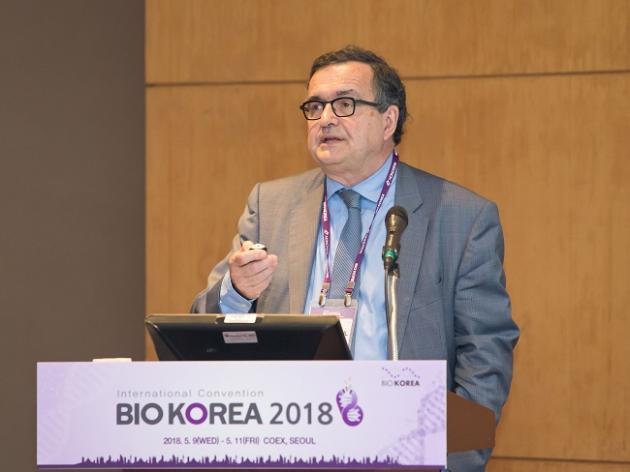Belgian professor praise biosimilars for low cost, good quality
“Biosimilars offer better quality than original drugs. This is a fact.”
Jean-Paul Deslypere, a professor at Belgium’s University Hospital of Ghent, made such bold comment in an interview with Korea Biomedical Review. He visited Korea to participate in the Bio Korea 2018, an industry event held at COEX in southern Seoul from Wednesday to Friday last week.
At a session on global market strategy for biosimilar drugs, Deslypere had a presentation on the global biosimilar market trend for maximizing cost efficiency.

He said the profitability of biosimilars is increasing, as people are using more biopharmaceutical products in the interview.
Although there were concerns about efficacy and safety in replacing original drugs with biosimilars at the initial stage of their market release, biosimilar products are now receiving recognition from experts, Deslypere said.
“Compared to generic drugs, biosimilars are expensive to develop, have a long development period, and require a higher level of information. Whether biosimilars can replace originals was also an issue,” the Belgian expert said. “However, physicians and papers support the use of biosimilars now. Anyone can use biosimilars under the guidance of professionals.”
Deslypere said biosimilars are cheaper than biopharmaceuticals, noting that social security spending has decreased due to the use of biosimilars in the West and Asia. “This means that biosimilars were playing their social role,” he said.
He expressed regret that biosimilars’ market penetration is still weak in many countries, despite their essential role in the public healthcare.
Deslypere also emphasized that Korea was becoming a new force in the biosimilar sector.
“In the pharma industry, Korea was not a powerhouse. It has a small market, and there is no such firm as Novartis or Pfizer. It didn’t play a significant role in generic drugs, either, as opposed to India,” Deslypere said. “But Korea is a leader in the biosimilar industry. As Korean firms such as Samsung Bioepis and Celltrion went global, Korea is positively helping to spread biosimilars around the world.”
For Korea to become a biosimilar hub, however, the nation should meet several conditions first, Deslypere said.
First, the government should give companies incentives for R&D to promote the biosimilar industry, he said.
The country also needs to nurture professionals through education programs in the biotech sector, he added.
Asked whether he has tried using a Korean biosimilar, Deslypere said he had not used any Korean biosimilar because he specialized in endocrinology. “I heard about my colleague’s experience of using Korean biosimilars,” he said.
The professor emphasized that although biosimilars are destined to arrive in the market later than original drugs, they are not only cheaper than originals but able to secure improved product quality during the manufacturing process.
“Biosimilars are not chemical compositions. So, they can be produced in the same way with originals. But biosimilars can show different efficacy even with minor differences in conditions,” Deslypere said. “In the manufacturing process, the uniformity of the product is important. As a latecomer, a biosimilar can improve the quality further. In fact, there were several cases where a biosimilar’s quality was higher than that of an original.”

